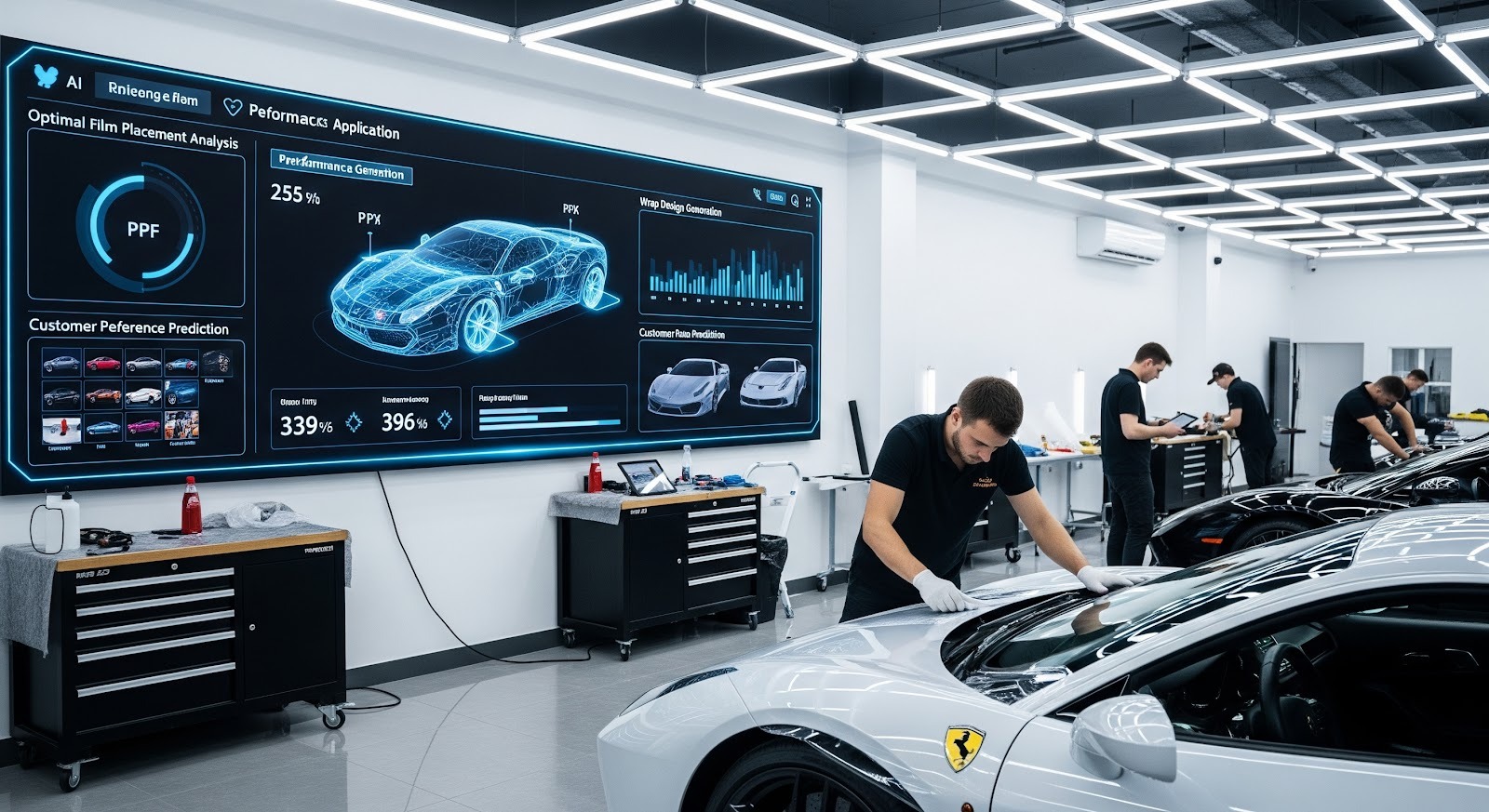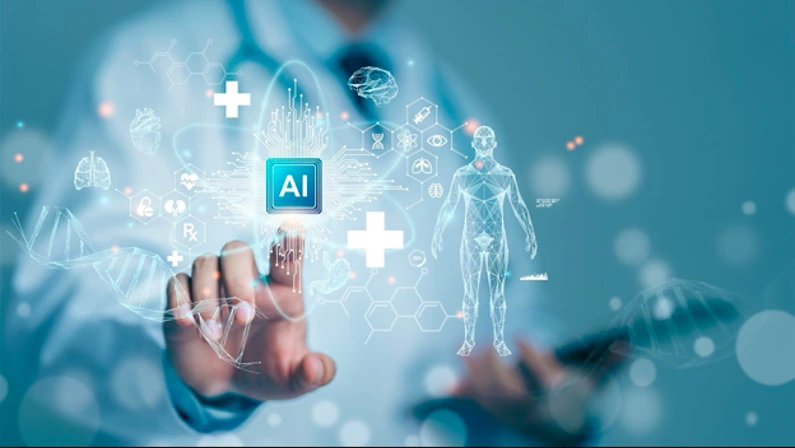
Artificial intelligence is transforming healthcare by improving how doctors diagnose, treat, and care for patients. With its ability to analyze vast amounts of data quickly, AI used in healthcare is making medical systems more accurate, efficient, and patient-focused. From disease detection to patient monitoring, AI being used in healthcare is no longer a future concept—it’s happening now.
Should AI be used in healthcare?
As hospitals adopt more AI technology used in healthcare, its impact on decision-making, diagnostics, and patient safety continues to grow. This article explores how AI is used in healthcare, its benefits, challenges, and the exciting possibilities shaping the future of AI in healthcare.
What Is AI in Healthcare?
What does AI do in healthcare? Artificial intelligence in the medical field refers to the use of advanced algorithms, data analysis, and machine learning to assist healthcare professionals in making accurate diagnoses, predicting outcomes, and improving patient care.
AI models in healthcare analyze massive amounts of medical data faster than humans, helping doctors and hospitals make informed decisions. From identifying early signs of disease to personalizing treatment plans, AI is rapidly becoming an integral part of modern medicine.
How Is AI Used in Healthcare Today?
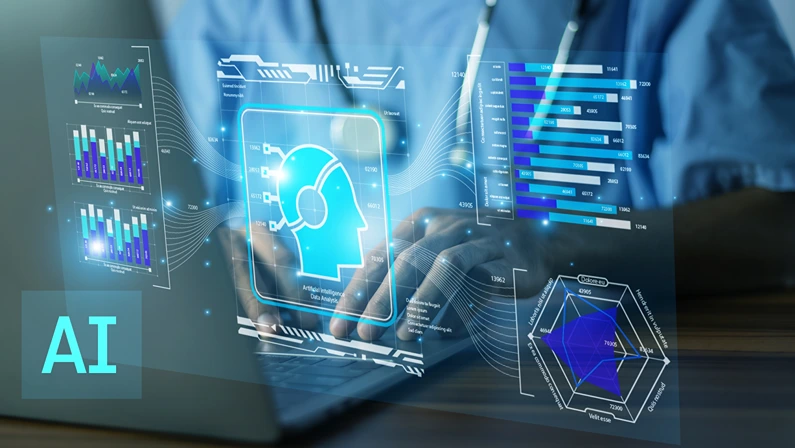
Where is AI used in healthcare? AI being used in healthcare extends across a wide range of applications.
Here are some of the most common ways AI is transforming the medical landscape:
Medical Imaging and Diagnostics
AI technology used in healthcare can detect abnormalities in X-rays, CT scans, and MRIs, often identifying issues invisible to the human eye.
Predictive Analytics
Hospitals use AI to analyze patient data and forecast potential health risks, such as heart attacks or strokes.
Virtual Health Assistants
AI chatbots and voice assistants support patient inquiries, appointment scheduling, and post-treatment care.
Robotic Surgery
AI-guided surgical robots enhance precision and reduce human error during complex procedures.
Administrative Automation
AI in hospitals helps streamline billing, patient records, and other administrative tasks.
What Are the Benefits of Using AI in Healthcare?
The benefits of AI in healthcare are vast and continue to grow as technology advances.
Improved Diagnostic Accuracy
AI systems analyze vast datasets to identify patterns that may indicate diseases at earlier stages.
Enhanced Patient Experience
AI uses in healthcare include faster appointment scheduling, personalized treatment plans, and remote monitoring, improving patient satisfaction.
Cost Efficiency
By automating repetitive tasks, AI helps hospitals reduce operational costs.
Faster Results
AI models in healthcare process medical data quickly, allowing doctors to make faster decisions and begin treatments sooner.
Accessibility
AI makes medical expertise more widely available, especially in rural or underserved areas.
How Does AI Help Doctors Make Better Medical Decisions?
AI supports physicians by delivering insights that might not be apparent through traditional analysis.
Clinical Decision Support Systems (CDSS)
AI-powered tools evaluate patient data and suggest possible diagnoses or treatment plans.
Data-Driven Insights
By combining data from lab results, genetics, and medical history, AI helps doctors develop personalized therapies.
Error Reduction
AI systems cross-check medical data, reducing the chances of oversight or misdiagnosis.
Continuous Learning
AI models in healthcare improve with every interaction, continually learning to provide better recommendations.
How Is AI Used in Medical Imaging and Diagnostics?
One of the most impactful areas where AI is used in healthcare is medical imaging.
Disease Detection
AI can identify tumors, fractures, or other abnormalities faster and with higher accuracy than manual methods.
Pattern Recognition
Machine learning algorithms detect patterns in images that correlate with specific diseases.
Workflow Optimization
AI prioritizes critical cases, ensuring that urgent patients receive prompt attention.
Enhanced Reporting
AI-generated reports help radiologists interpret results more efficiently.
How Does AI Support Drug Discovery and Medical Research?
AI technology used in healthcare accelerates research and development in medicine.
Molecule Screening
AI can analyze thousands of compounds quickly to find potential drug candidates.
Predicting Outcomes
Algorithms predict how drugs will react in the human body, reducing trial-and-error.
Clinical Trials
AI identifies suitable participants and predicts trial results, cutting down research time.
Data Integration
AI brings together genomic data, medical literature, and research findings for faster insights.
How Is AI Improving Patient Care and Monitoring?
AI plays a crucial role in improving patient care both inside and outside hospitals.
Remote Monitoring
Wearable devices powered by AI track vital signs and alert doctors about any irregularities.
Personalized Treatment
AI uses patient data to tailor treatment plans to individual needs.
Virtual Nursing Assistants
Patients can access AI-driven chatbots for guidance on medication and recovery.
Preventive Care
AI predicts potential health issues, allowing doctors to intervene early.
Can AI Help Prevent Medical Errors and Misdiagnoses?
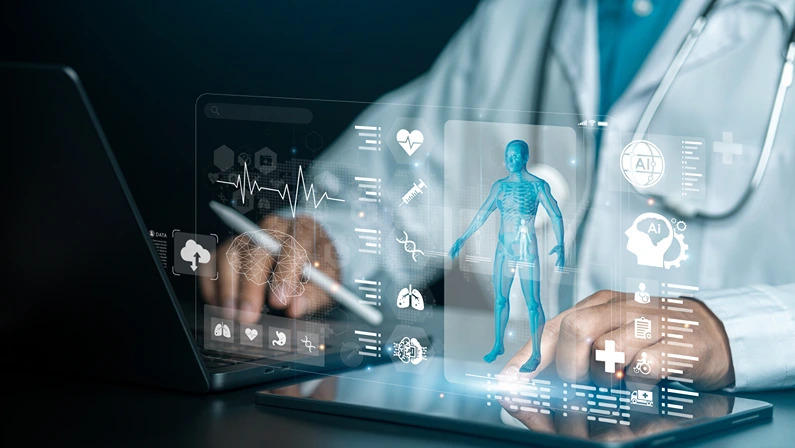
Yes, AI in hospitals has proven effective in reducing human errors. By comparing patient data against large datasets, AI systems highlight potential discrepancies or missed diagnoses. These intelligent systems also cross-reference medications and allergies, preventing harmful drug interactions. As a result, patients receive safer, more precise treatment recommendations.
What Are the Challenges of Implementing AI in Healthcare?
Despite its promise, integrating AI in hospitals and clinics comes with challenges.
Data Privacy
Ensuring patient confidentiality while using AI is a top concern.
Integration with Legacy Systems
Many hospitals use older systems that may not support new AI technologies.
Regulatory Barriers
Approvals for AI-based tools can be time-consuming due to strict medical standards.
Training Requirements
Medical professionals must be trained to use AI systems effectively.
Cost of Implementation
Initial investment in AI technology used in healthcare can be significant, though it pays off long-term.
How Does AI Impact Healthcare Professionals and Jobs?
AI does not replace healthcare professionals; it enhances their abilities. By automating repetitive tasks, doctors and nurses can focus more on patient care. However, some roles will evolve as new skills in data analysis and AI system management become essential.
Many healthcare providers are collaborating with digital solutions companies like Leapify, which helps hospitals integrate AI tools while empowering staff to adapt to these new technologies.
What Is the Future of AI Use in Healthcare?
The future of AI use in healthcare looks promising. As algorithms become more sophisticated, AI will play an even greater role in predicting diseases, supporting mental health, and streamlining healthcare management. AI will also help create personalized medicine by analyzing genetic data to tailor treatments to individual patients. With ongoing innovation, artificial intelligence in the medical field will continue reshaping how hospitals deliver care.
How Can Hospitals and Clinics Start Adopting AI Solutions?
Healthcare institutions can begin by identifying areas where AI offers the most impact.
Assess Current Needs
Evaluate which departments, such as radiology, administration, or patient care, would benefit from automation.
Collaborate with Experts
Partner with AI solution providers to ensure seamless integration.
Ensure Data Security
Implement systems that comply with healthcare privacy regulations.
Train Staff
Equip employees with the knowledge to use and maintain AI systems.
Monitor and Improve
Continuously evaluate performance to maximize efficiency and accuracy.
Empowering the Future of Medicine with AI
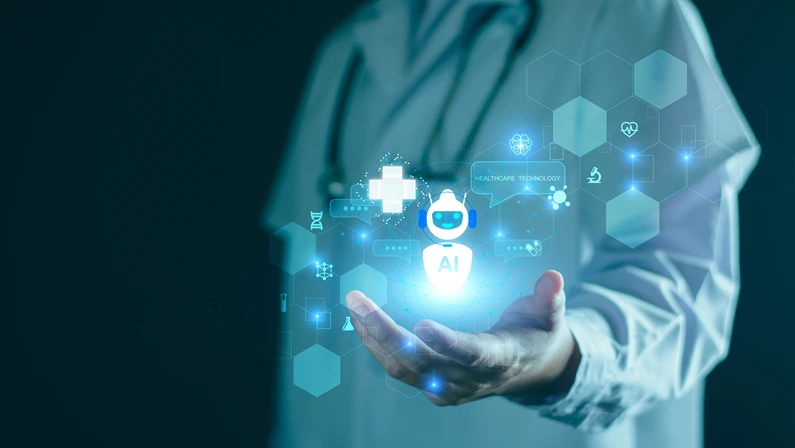
The growing presence of AI being used in healthcare marks a turning point in the way medical professionals diagnose, treat, and care for patients. As technology evolves, hospitals that embrace innovation will gain a competitive advantage in delivering quality healthcare.
Artificial intelligence in the medical field is no longer a concept, but now the foundation of a smarter, more connected future in healthcare. Leveraging an AI platform for healthcare like Leapify enables hospitals and clinics to streamline workflows, enhance diagnostic accuracy, and improve patient outcomes. Contact us today!



